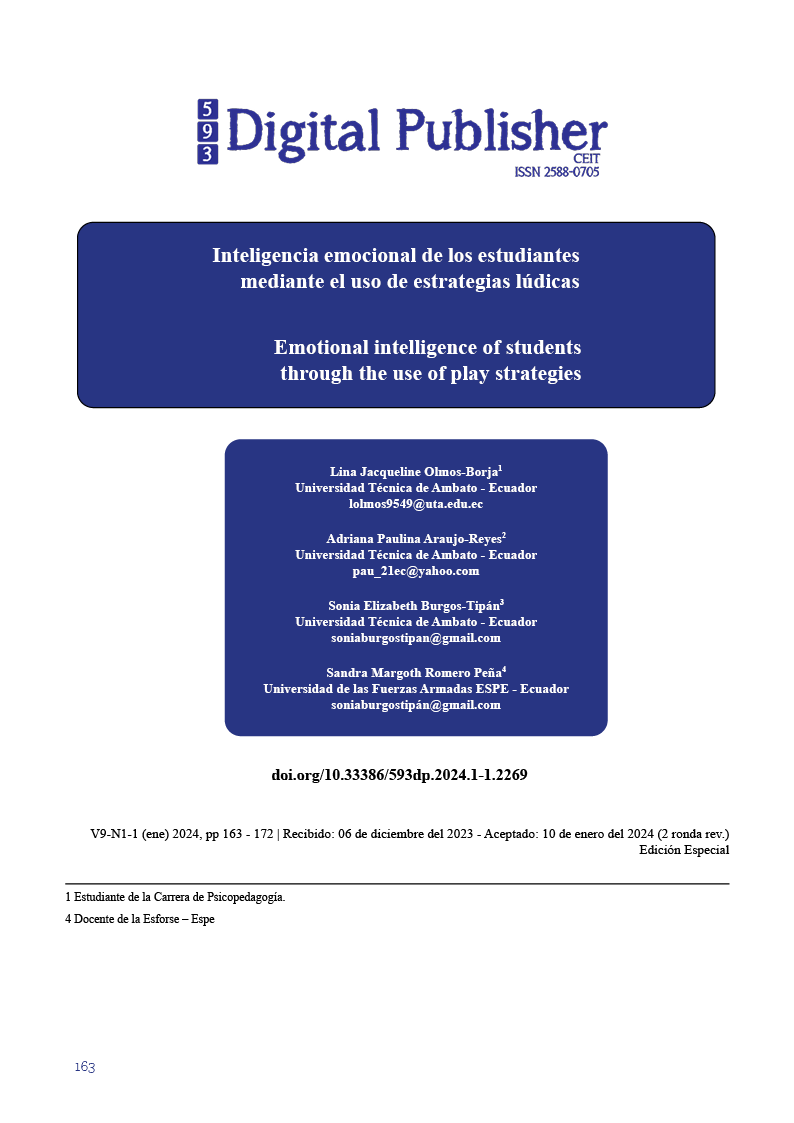Inteligencia emocional de los estudiantes mediante el uso de estrategias lúdicas
Contenido principal del artículo
Resumen
La presente investigación aborda como temática principal la importancia de la inteligencia emocional como requisito fundamental en el éxito personal y social, al mismo tiempo que se destaca la utilidad de las estrategias lúdicas como herramienta fundamental para desarrollar la inteligencia emocional en estudiantes y de esta manera alcanzar un desarrollo integral de la persona en todos sus ámbitos. Para cumplir con este objetivo se comienza con un análisis por separado de la inteligencia emocional y las estrategias lúdicas. Posteriormente se realiza una descripción detallada de la relación entre Inteligencia Emocional y Estrategias Lúdicas, evidenciando la necesidad de incluir contenidos al respecto tanto en la formación docente como de forma transversal en la educación a nivel escolar y universitario.
Descargas
Detalles del artículo

Esta obra está bajo una licencia internacional Creative Commons Atribución-NoComercial-CompartirIgual 4.0.
1. Derechos de autor
Las obras que se publican en 593 Digital Publisher CEIT están sujetas a los siguientes términos:
1.1. 593 Digital Publisher CEIT, conserva los derechos patrimoniales (copyright) de las obras publicadas, favorece y permite la reutilización de las mismas bajo la licencia Licencia Creative Commons 4.0 de Reconocimiento-NoComercial-CompartirIgual 4.0, por lo cual se pueden copiar, usar, difundir, transmitir y exponer públicamente, siempre que:
1.1.a. Se cite la autoría y fuente original de su publicación (revista, editorial, URL).
1.1.b. No se usen para fines comerciales u onerosos.
1.1.c. Se mencione la existencia y especificaciones de esta licencia de uso.
Citas
Agudelo Velasquez, L. P., Martinez Garcia, A. I., & Velasquez Tobon, M. I. Integración de la lúdica en el fortalecimiento de la inteligencia emocional. (Tesis de maestría). Fundación universitaria los libertadores, Medellín.
Aucasi Tenorio, G. M. (2022). Estrategias para el desarrollo de habilidades sociales en estudiantes de la Institución Educativa de Santillana. Horizonte de la Ciencia, 83-91.
Barrera Gálvez, R., Solano Pérez, C. T., Arias Rico, J., Jaramillo Morales, O. A., & Jiménez Sánchez, R. C. (2019). La inteligencia emocional en estudiantes universitarios. Educación Y Salud Boletín Científico Instituto De Ciencias De La Salud Universidad Autónoma Del Estado De Hidalgo, 50-55.
Caballero, F. B. (2017). Inteligencia emocional en el salón de clases. Innovación y desarrollo profesional docente, 17-24.
Cabezas Heredía, E., Molina Granja, F., & Ricaurte, P. (2019). Estrategia Lúdica para enseñanza en estudiantes de Ingeniería. Caso práctico. Revista Espacios, 10.
Cisneros Bedón, J., & Escudero Moyano, G. E. Estrategias lúdicas para mejorar el rendimiento académico en niños con TDAH del nivel básica, elemental y media [tesis de maestría, Universidad Tecnológica Indoamérica. Repositorio institucional.
Cuenca, A. El rol del docente en el fortalecimiento de la inteligencia emocional en niños de Educación Inicial de 4 años[Tesis de maestria,Universidad Técnica de Machala]. Repositorio Institucional.
Domenech, B. D. (2019). La autoeficacia académica y la inteligencia emocional como factores asociados al éxito académico de los estudiantes universitarios. Gestión de las Personas y Tecnología, 46-60.
Duche Pérez, A. B., Paredes Quispe, F. M., Gutiérrez Aguilar, O. A., & Carcausto Cortez, L. C. (2020). Transición secundaria-universidad y la adaptación a la vida universitaria. Revista de ciencias sociales, 244-258.
Fernández Berrocal, P. (2018). Inteligencia emocional: aprender a gestionar las emociones. Shackleton Books.
Gallego Gil, D., & Ongallo Chanclón, C. (2020). El ‘emofeedback’: la inteligencia emocional y el feedback en los procesos de acompañamiento. Revista de Ciencias de la Comunicación e Información, 1-22.
Gilar Corbi, R., Pozo Rico, T., & Castejón Costa, J. L. (2019). Desarrollando la inteligencia emocional en educación superior: evaluación de la efectividad de un programa en tres países. Educación XX1, 161-187.
Guerrero Dávila, G., & Guerrero Dávila, C. (2020). Metodología de la investigación. Grupo Editorial Patria.
Hidalgo Andrade, P., Cañas Lerma, A., & Cuartero Castañer, M. E. (2022). Autocuidado, afrontamiento e inteligencia emocional en estudiantes universitarios. Revista INFAD de Psicología. International Journal of Developmental and Educational Psychology., 327-340.
Luy Montejo, C. (2019). El Aprendizaje Basado en Problemas (ABP) en el desarrollo de la inteligencia emocional de estudiantes universitarios. Propósitos y representaciones, 353-383.
Maureira, F. (2018). Que es la inteligencia. En F. Maureira, Que es la inteligencia (págs. 52,53,59,63,64,65,66,67). España: Bubok Publishing S.L.
Mercadé, A. (2019). Los 8 tipos de inteligencia según Howard Gardner: la teoría de las inteligencias múltiples.
Merino Gomez, B. (2018). Guías HBR: Inteligencia emocional. En B. Merino Gomez, Guías HBR: Inteligencia emocional (págs. 169-175). Barcelona: Reverté.
Moscoso, M. S. (2019). Hacia una integración de mindfulness e inteligencia emocional en psicología y educación. Liberabit, 107-117.
Pegalajar Palomino, M. C. (2021). Implicaciones de la gamificación en Educación Superior: una revisión sistemática sobre la percepción del estudiante. Revista de Investigación Educativa, 169-188.
Quiliano Navarro, M. &. (2020). Inteligencia emocional y estrés académico en estudiantes de enfermería. Ciencia y enfermería, 26.
Rivera, M. D., & Domínguez Saldívar, A. (2021). Las estrategias del programa RULER para desarrollar la Inteligencia Emocional. Conisen.
Sánchez Teruel, D., & Robles Bello, M. A. (2018). Instrumentos de evaluación en inteligencia emocional: una revisión sistemática cuantitativa. Perspectiva Educacional, 27-50.
Unuzungo Preciado, M., Balladares Atoche, C., Bravo Cedeño, B., Gordon Torres, C., Quito Santana, L., & Fernandez Unuzungo, G. (2022). Habilidades sociales: desarrollo desde lo lúdico, en niños de etapa pre escolar. Ciencia Latina Revista Científica Multidisciplinar, 544-557.





